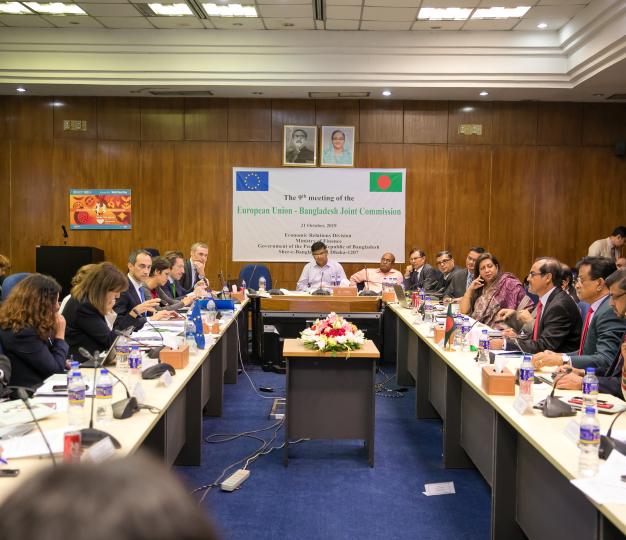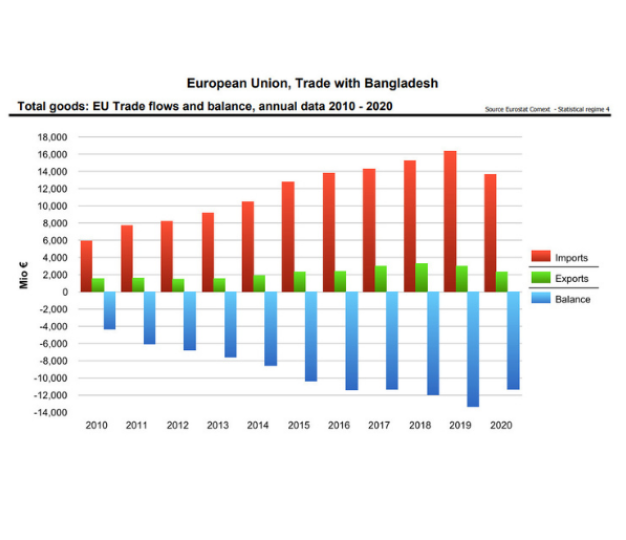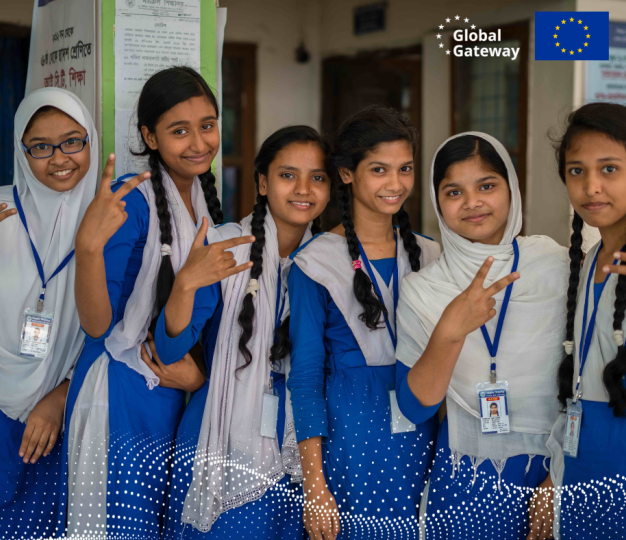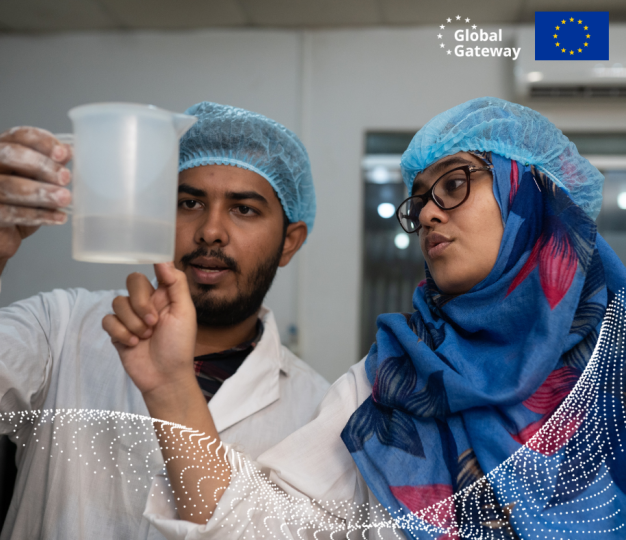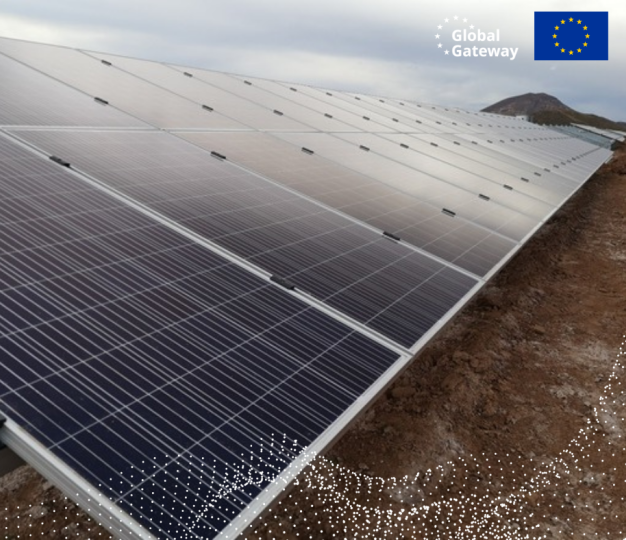RELATIONS WITH THE EU
The European Union and Bangladesh
The European Union and Bangladesh are working together in various sectors.
Political & Economic Relations
More than 45 years of diplomatic relations between the EU and Bangladesh
The EU is broadly supportive of the Bangladesh government's reform agenda and emphasises the need for it to deliver on its promises and ensure compliance with its human rights obligations.
Development assistance
The main areas where the EU helps Bangladesh are economic development, human rights, good governance and the environment. Under its Multiannual Indicative Programme for Bangladesh 2014-2020, the EU has committed aid of up to €690 million (without considering Thematic and Regional funds).
Economy
Today, by revenue, over half of Bangladesh’s exports go to the EU (55.5% in the first quarter of 2016, according to Bangladesh Bank). This is due largely to the highly advantageous trade terms granted by the EU (the "Everything but Arms" (EBA) scheme).
Bangladesh now enjoys a significant trade surplus with the EU (Bangladesh-EU trade statistics).
Key agreements
- EU-Bangladesh Cooperation Agreement.
- Covers trade, economic development, human rights, good governance and the environment.
- Agreement on Trade in Textiles Products.
- Regulates the distribution of export licenses from Bangladesh – although today (due to the EBA scheme) Bangladesh no longer has any quota restrictions on its exports to the EU.
- EU strategy paper for Bangladesh.
Trade and Investment
The European Union is the largest export destination & trading partner of Bangladesh
The European Union (EU’s) trade relations with Bangladesh are based on unilateral trade preferences granted by the EU since 2001 under the GSP Everything but Arms (EBA) duty-free, quota-free market access arrangement for the LDCs.
The EU is Bangladesh's largest export destination, accounting for over 60 per cent of all exports to the EU under EBA. From 2011 to 2019, Bangladeshi exports to the EU rose from €9.0 billion to over €19 billion, while EU exports to Bangladesh improved from €1.7 billion to 3.4 billion during the same period.
Bangladesh’s major export products include clothing (over 90%), footwear, frozen food, agro-products, among others, while the EU’s major exports to Bangladesh are machinery, transport equipment, and chemicals.
Investment by European companies in Bangladesh offers jobs & skills, better working conditions & CSR, state-of-the-art technology, globally competitive products, and economic diversity.
The EU-Bangladesh Business Climate Dialogue, coordinated by the EU Delegation in Dhaka and Bangladeshi Commerce Ministry, is aimed at promoting trade and investment.
Workplace Safety & Respect for labour rights
Following the Rana Plaza tragedy in July 2013, the EU created the Sustainability Compact, with the Government of Bangladesh, the US, Canada, plus, ILO, with commitments to improve workplace safety, respect for labour rights, and responsible business conduct.
Since 1 July 2021, under the EU Enhanced Engagement with Bangladesh as a GSP EBA beneficiary, the Government of Bangladesh put into implementation a National Action Plan (NAP) on the labour sector for the next five years ((2021-2026)). The NAP aims to bring the Bangladesh Labour Act and Export Processing Zone Labour Law up to international standards.
Related information
Access2Markets: Exporting from the EU, importing into the EU - all you need to know
EU's Development Cooperation with Bangladesh
EU-Bangladesh diplomatic relations were established in 1973. In 2001, a cooperation agreement was signed extending to trade, economic and development cooperation, human rights, good governance and the environment. Our Multi-annual Indicative Programme (MIP) for Bangladesh for 2021-2027 focuses on three priority areas: Human Capital Development, Green Inclusive Development, and Inclusive Governance. The MIP aims to strengthen cooperation in key areas and enhance education, employment opportunities, energy efficiency, environmental protection, gender equality, access to justice, public services, and migration management.
Global Gateway
Global Gateway is the European Startegy to boost smart, clean, and secure connections in digital, energy, and transport sectors worldwide while strengthening health, education, and research systems. With a focus on the UN's Agenda 2030 and the Paris Agreement, it aims to mobilize investments of up to €300 billion. Through the 'Team Europe Approach,' the European Union and its Member States are collaborating with private sector to drive transformative impact. In Bangladesh, Team Europe Initiatives support actions on decent work and green energy transition in partnership with multiple European countries.
Find more about the Team Europe Initiatives in Bangladesh.
Humanitarian Aid
EU’s aid to Bangladesh in natural disasters and humanitarian crisis
The EU's humanitarian arm, ECHO, supports the following in Bangladesh:
Disaster preparedness
For example, building flood-resistant infrastructure and early warning systems.
Emergency response
In particular for tropical storms and heavy monsoon rains, which cause severe floods.
Support includes building transitional shelters, latrines and wells, providing food security and nutrition, as well as educational awareness surrounding water and sanitation.
Specific interventions
-
Cyclone Mahasen, 2013 (livelihood assistance, shelter repairs).
-
Rohingya refugees in Cox's Bazar District (nutrition, health, water & sanitation).
-
Chittagong Hill Tracts (livelihood and food assistance).
More on EU humanitarian aid for Bangladesh.
EU’s COVID-19 response and actions in Bangladesh
The EU has allocated EUR 334 million to help fight the pandemic
In its ongoing development cooperation programmes in Bangladesh, the EU is already addressing many areas crucial in the COVID-response and the recovery of the economy (e.g. in food security, private sector development, WASH). On top of that, the EU is pleased to announce that EUR 334 million have been allocated to help fight the pandemic and that more funds may be mobilised in the near future.
The EU has mobilized resources to help Bangladesh fight Covid-19:
-
EU and Germany join forces with the Government of Bangladesh to support unemployed factory workers in RMG and Leather sector.(31/12/2020)
-
The European Union and Germany contribute to strengthening social security in Bangladesh with EUR 80 million. (24/12/2020)
-
Team Europe is mobilising over € 334 million (around BDT 31 billion) for the fight against Covid-19 and its consequences in Bangladesh. (20/05/2020)
-
The European Union and Germany join forces with the Government of Bangladesh to safeguard the livelihoods of workers in the export-oriented industries. (10/12/2020)
-
The European Union commits € 32 million (304 Crore Taka) responding to the needs of Bangladeshi Host Communities and Rohingyas in Cox’s Bazar. (02/07/2020)
-
Protection and empowerment of Rohingya Refugees in Bangladesh. (04/10/2020)

